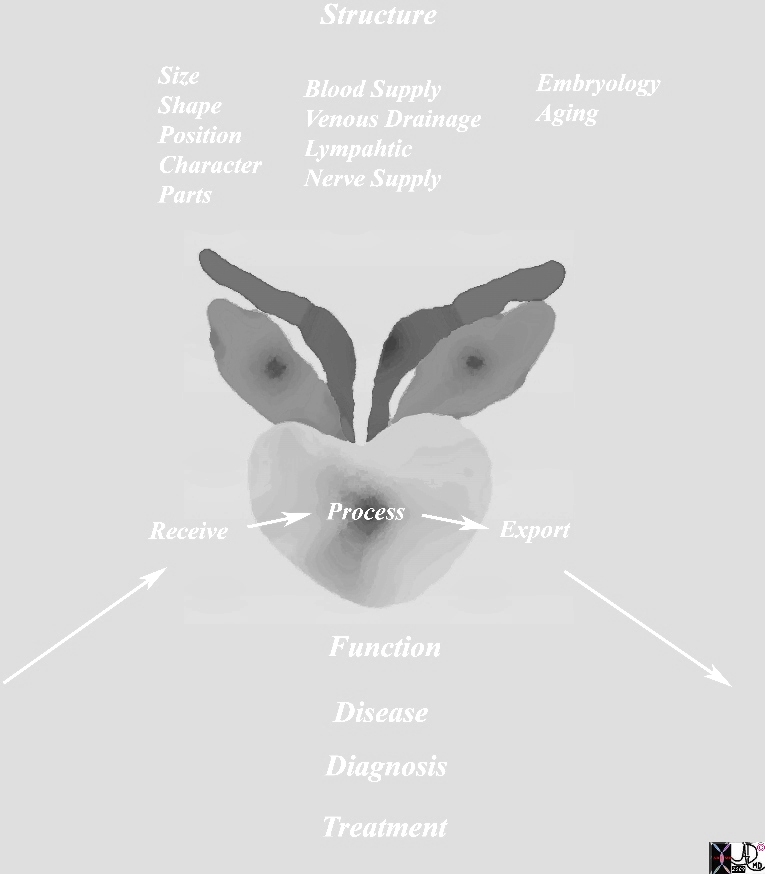Approaches to Imaging the Prostate
Alok Anand MD
The Common Vein Copyright 2010
Introduction
A general approach to evaluation of the prostate is that the first line of diagnosis is usually physical examination, via the digital rectal examination. An experienced practitioner can characterize the various zones, and their composition, in addition to a gross assessment of size, shape, and symmetry.

Imaging in Scales of Gray |
|
This diagram frames the underlying principles and approach to the prostate in this module The prostate and seminal vesicles are accessible to the transrectal probe and using ultrasound, X-rays or protons structural evaluation is optimised in shades of gray.
Courtesy Ashley Davidof MD Copyright 2010 99380b01.46.82s
|
The most important disease processeses where imaging is used as an aid is in prostate cancer. Although no imaging modality is relabile in diagnosing or ruling out malignancy, imaging serves as an adjunct in the diagnosis and staging.
Biopsy is performed with Ultrasound guidance. MR, usually with the aid of endorectal coils and transrectal ultrasound are useful in staging local disease.
Finally CT and MR are useful in staging in the presence of nodal or distant metastases. PET-CT does not have a well-defined role in the evaluation of prostate cancer, as areas of disease do not typically have significantly elevated metabolic rates. CT is also useful in radiation treatment planning.
Bone scintigraphy is often useful for assessing the spread of prostate cancer to bony areas, usually within the axial skeleton.
DOMElement Object
(
[schemaTypeInfo] =>
[tagName] => table
[firstElementChild] => (object value omitted)
[lastElementChild] => (object value omitted)
[childElementCount] => 1
[previousElementSibling] => (object value omitted)
[nextElementSibling] => (object value omitted)
[nodeName] => table
[nodeValue] =>
Imaging in Scales of Gray
This diagram frames the underlying principles and approach to the prostate in this module The prostate and seminal vesicles are accessible to the transrectal probe and using ultrasound, X-rays or protons structural evaluation is optimised in shades of gray.
Courtesy Ashley Davidof MD Copyright 2010 99380b01.46.82s
[nodeType] => 1
[parentNode] => (object value omitted)
[childNodes] => (object value omitted)
[firstChild] => (object value omitted)
[lastChild] => (object value omitted)
[previousSibling] => (object value omitted)
[nextSibling] => (object value omitted)
[attributes] => (object value omitted)
[ownerDocument] => (object value omitted)
[namespaceURI] =>
[prefix] =>
[localName] => table
[baseURI] =>
[textContent] =>
Imaging in Scales of Gray
This diagram frames the underlying principles and approach to the prostate in this module The prostate and seminal vesicles are accessible to the transrectal probe and using ultrasound, X-rays or protons structural evaluation is optimised in shades of gray.
Courtesy Ashley Davidof MD Copyright 2010 99380b01.46.82s
)
DOMElement Object
(
[schemaTypeInfo] =>
[tagName] => td
[firstElementChild] => (object value omitted)
[lastElementChild] => (object value omitted)
[childElementCount] => 2
[previousElementSibling] =>
[nextElementSibling] =>
[nodeName] => td
[nodeValue] =>
This diagram frames the underlying principles and approach to the prostate in this module The prostate and seminal vesicles are accessible to the transrectal probe and using ultrasound, X-rays or protons structural evaluation is optimised in shades of gray.
Courtesy Ashley Davidof MD Copyright 2010 99380b01.46.82s
[nodeType] => 1
[parentNode] => (object value omitted)
[childNodes] => (object value omitted)
[firstChild] => (object value omitted)
[lastChild] => (object value omitted)
[previousSibling] => (object value omitted)
[nextSibling] => (object value omitted)
[attributes] => (object value omitted)
[ownerDocument] => (object value omitted)
[namespaceURI] =>
[prefix] =>
[localName] => td
[baseURI] =>
[textContent] =>
This diagram frames the underlying principles and approach to the prostate in this module The prostate and seminal vesicles are accessible to the transrectal probe and using ultrasound, X-rays or protons structural evaluation is optimised in shades of gray.
Courtesy Ashley Davidof MD Copyright 2010 99380b01.46.82s
)
DOMElement Object
(
[schemaTypeInfo] =>
[tagName] => td
[firstElementChild] => (object value omitted)
[lastElementChild] => (object value omitted)
[childElementCount] => 2
[previousElementSibling] =>
[nextElementSibling] =>
[nodeName] => td
[nodeValue] =>
Imaging in Scales of Gray
[nodeType] => 1
[parentNode] => (object value omitted)
[childNodes] => (object value omitted)
[firstChild] => (object value omitted)
[lastChild] => (object value omitted)
[previousSibling] => (object value omitted)
[nextSibling] => (object value omitted)
[attributes] => (object value omitted)
[ownerDocument] => (object value omitted)
[namespaceURI] =>
[prefix] =>
[localName] => td
[baseURI] =>
[textContent] =>
Imaging in Scales of Gray
)

